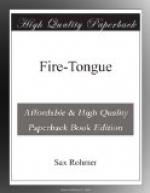Silence fell in the big room, Nicol Brinn staring down vacantly into the empty fireplace, Paul Harley standing watching him in a state of almost stupefied mystification. Muffled to a soothing murmur the sounds of Piccadilly penetrated to that curtained chamber which held so many records of the troubled past and which seemed to be charged with shadowy portents of the future.
Something struck with a dull thud upon a windowpane—once—twice. There followed a faint, sibilant sound.
Paul Harley started and the stoical Nicol Brinn turned rapidly and glanced across the room.
“What was that?” asked Harley.
“I expect—it was an owl,” answered Brinn. “We sometimes get them over from the Green Park.”
His high voice sounded unemotional as ever. But it seemed to Paul Harley that his face, dimly illuminated by the upcast light from the lamp upon the coffee table, had paled, had become gaunt.
CHAPTER VI. PHIL ABINGDON ARRIVES
On the following afternoon Paul Harley was restlessly pacing his private office when Innes came in with a letter which had been delivered by hand. Harley took it eagerly and tore open the envelope. A look of expectancy faded from his eager face almost in the moment that it appeared there. “No luck, Innes,” he said, gloomily. “Merton reports that there is no trace of any dangerous foreign body in the liquids analyzed.”
He dropped the analyst’s report into a wastebasket and resumed his restless promenade. Innes, who could see that his principal wanted to talk, waited. For it was Paul Harley’s custom, when the clue to a labyrinth evaded him, to outline his difficulties to his confidential secretary, and by the mere exercise of verbal construction Harley would often detect the weak spot in his reasoning. This stage come to, he would dictate a carefully worded statement of the case to date and thus familiarize himself with its complexities.
“You see, Innes,” he began, suddenly, “Sir Charles had taken no refreshment of any kind at Mr. Wilson’s house nor before leaving his own. Neither had he smoked. No one had approached him. Therefore, if he was poisoned, he was poisoned at his own table. Since he was never out of my observation from the moment of entering the library up to that of his death, we are reduced to the only two possible mediums—the soup or the water. He had touched nothing else.”
“No wine?”
“Wine was on the table but none had been poured out. Let us see what evidence, capable of being put into writing, exists to support my theory that Sir Charles was poisoned. In the first place, he clearly went in fear of some such death. It was because of this that he consulted me. What was the origin of his fear? Something associated with the term Fire-Tongue. So much is clear from Sir Charles’s dying words, and his questioning Nicol Brinn on the point some weeks earlier.




